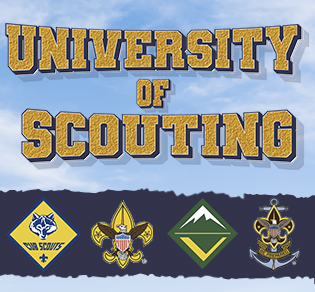







May 1, 2025 - Outdoor Adventures
University of Scouting is a semi-annual supplemental training program. Sessions are led by experienced volunteers who will help leaders and parents enhance their ability to deliver a fun and exciting program to the Scouts. The spring event will focus on outdoor trainings.
Registration
There is no onsite registration. At checkout, pay with a credit card or electronic check. (Registration Instructions. Council refund policy.)






 What to Bring
What to Bring
About Introduction To Outdoor Leader Skills (IOLS)
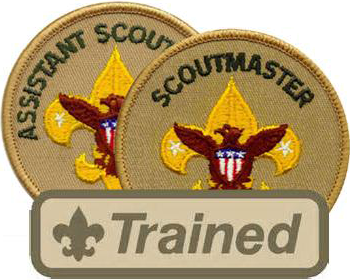






 Introduction to Outdoor Leader Skills (IOLS) is a 16-hour overnight course that gives adult leaders the practical knowledge they need to help Scouts to learn outdoor skills. The skills presented closely follow the Scout Handbook and rank advancement requirements. This is a required training course for all Scoutmaster and assistant Scoutmasters. Working as patrols, this hands-on course provides adult leaders the practical outdoor skills they need to lead Scouts in the out-of-doors. Upon completion, leaders should feel comfortable teaching Scouts the basic skills required to obtain the First Class rank. Topics covered: • Campsite Selection • Ropes – Whipping, Tying, and Lashing • Wood Tools – Knife, Camp Saw, and Ax • Fire Site Preparation and Building • Cooking • First Aid • Plant and Animal Identification • Packing and Hiking Techniques • Map and Compass • Leave No Trace. The training encompasses a weekend (16 hours of instruction).
Introduction to Outdoor Leader Skills (IOLS) is a 16-hour overnight course that gives adult leaders the practical knowledge they need to help Scouts to learn outdoor skills. The skills presented closely follow the Scout Handbook and rank advancement requirements. This is a required training course for all Scoutmaster and assistant Scoutmasters. Working as patrols, this hands-on course provides adult leaders the practical outdoor skills they need to lead Scouts in the out-of-doors. Upon completion, leaders should feel comfortable teaching Scouts the basic skills required to obtain the First Class rank. Topics covered: • Campsite Selection • Ropes – Whipping, Tying, and Lashing • Wood Tools – Knife, Camp Saw, and Ax • Fire Site Preparation and Building • Cooking • First Aid • Plant and Animal Identification • Packing and Hiking Techniques • Map and Compass • Leave No Trace. The training encompasses a weekend (16 hours of instruction).
What to Bring: In addition to the list above, bring the following: Clothes: field uniform, activity uniform (Scout t-shirt) or comfortable clothes, closed-toed shoes (boots or tennis shoes), jacket, rain gear. Scouting ten essentials: pocket knife, first aid kit, extra clothes, rain gear, refillable water bottle, flashlight or headlamp with extra batteries, trail food, match and fire starters, sun protection, map and compass. Personal Gear: tent, ground cloth, camp chair, sleeping bag or blanket, sleeping pad or cot, mess kit (knife, fork, spoon, bowl/plate, coffee cup in a mesh bag), bug repellant, sunscreen, personal hygiene products (e.g., toothpaste, deodorant), note-taking materials, 3-ring binder, backpack, personal medications. Recommended: Field Book, Troop Leader Guidebook, Scout Handbook. Optional gear: sunglasses, camera, earplugs, gloves for saw and ax demonstration. The course fee includes four meals (3 on Saturday and Sunday breakfast). Eat breakfast before arriving.
Cub Scout Training
About Trainer's EDGE (all-day training for youth and adult training)
About Red Cross Lifeguard
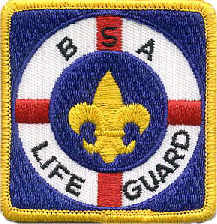






 Red Cross Lifeguard is a 27-hour long course for Scouts (ages 15+) and adults. To be trained as a Red Cross Lifeguard, participants must successfully complete the course and demonstrate the ability to perform specific requirements. Prerequisites: must take both Safe Swim Defense and Safety Afloat trainings online at my.scouting.org. If not current in First Aid and CPR/AED, the training will be offered during camp for an extra fee. Participants need to be strong swimmers (swim continuously for 550 yards in good form using the front crawl or breaststroke, then, tread water for two minutes using the legs only and with the hands under the armpits. Starting in the water, swim 20 yards using a front crawl or breaststroke, surface dive 7 to 10 feet, retrieve a 10-pound object, surface, swim on your back with the object 20 yards back to the starting point with both hands holding the object, and exit the water, all within 1 minute, 40 seconds. Observation hours will be completed at Full Throttle on April 26-28 or during summer camp.
Red Cross Lifeguard is a 27-hour long course for Scouts (ages 15+) and adults. To be trained as a Red Cross Lifeguard, participants must successfully complete the course and demonstrate the ability to perform specific requirements. Prerequisites: must take both Safe Swim Defense and Safety Afloat trainings online at my.scouting.org. If not current in First Aid and CPR/AED, the training will be offered during camp for an extra fee. Participants need to be strong swimmers (swim continuously for 550 yards in good form using the front crawl or breaststroke, then, tread water for two minutes using the legs only and with the hands under the armpits. Starting in the water, swim 20 yards using a front crawl or breaststroke, surface dive 7 to 10 feet, retrieve a 10-pound object, surface, swim on your back with the object 20 yards back to the starting point with both hands holding the object, and exit the water, all within 1 minute, 40 seconds. Observation hours will be completed at Full Throttle on April 26-28 or during summer camp.
Bring a swim suit, swim shorts, several towels, sunscreen, hat, sunglasses, several changes of clothes and toiletries. If you own them, bring fins, a mask, and a snorkel. If a cabin was reserved, bring sheets for a twin bed and a pillow. If camping, bring a tent and camping gear. Eat before arrival on Friday; a snack will be provided on Friday night. Three meals will be served on Saturday and two on Sunday. Arrive by 5:00 pm on Friday; the course should be completed by Sunday around 5:00 pm.
About Range Master Training
About Shooting Sports Training
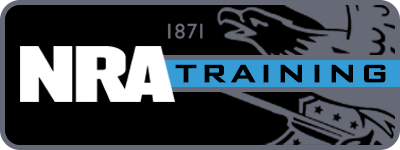






 NRA instructor trainings are designed to develop NRA-certified instructors who possess the knowledge, skills, and attitude necessary to safely teach the NRA basic firearm training courses. Through the NRA training, adults that already have subject matter expertise, learn how to conduct a firearms class the NRA way so the candidates earn the NRA Instructor certification. Learn more about becoming an NRA instructor.
NRA instructor trainings are designed to develop NRA-certified instructors who possess the knowledge, skills, and attitude necessary to safely teach the NRA basic firearm training courses. Through the NRA training, adults that already have subject matter expertise, learn how to conduct a firearms class the NRA way so the candidates earn the NRA Instructor certification. Learn more about becoming an NRA instructor.
What to bring: In addition to the list above, if a cabin was reserved, bring sheets for a twin bed and a pillow. If camping, bring a tent and camping gear.
NRA instructor trainings are conducted in two parts. The NRA Basic Instructor Training (BIT) is the first part of the two-step process. BIT is about how to instruct a firearm class according the NRA procedures and guidelines. Part two, the candidate completes one or more discipline-specific instructor courses, i.e., rifle, shotgun, pistol, etc. The BIT class is a pre-request for any instructor level NRA course and is only required to be taken once. \"An NRA range safety officer is required to provide live firing range supervision for all shooting activities involving Scouts BSA, Venturers, and Sea Scouts. No other certification is accepted. The NRA range safety officer is responsible for the range operation. (National Shooting Sports Manual, No 30931, p67)
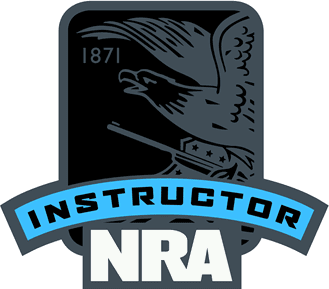






 Part 1: Basic Instructor Training (BIT) is two-parts. NRA instructor trainings are designed to develop NRA-certified instructors who possess the knowledge, skills, and attitude necessary to conduct the NRA basic firearm training courses. It is the NRA class that helps people who already have subject matter expertise learn how to hold a class the NRA way so that their students earn recognized NRA certification. NRA Basic Instructor Training (BIT) is the first part of the two-part course to becoming an NRA Certified Instructor and covers lessons one to five of every course. BIT is the first part of every discipline-specific NRA instructor course and must be renewed every two years. Participants learn essential methods of conducting a formal NRA class in the use of firearms and concludes with "preparing to teach" followed by the trainers examination. Participants learn the essential methods to safely conduct a formal NRA class in the use of firearms. The student must complete the entire class and pass the trainers examination before moving to an instructor course. Learn more about becoming an NRA instructor. NRA Instructor Training Courses help you develop the additional knowledge, skills and techniques needed to organize and teach courses in the NRA Basic Firearm Training Program." (Source)
Part 1: Basic Instructor Training (BIT) is two-parts. NRA instructor trainings are designed to develop NRA-certified instructors who possess the knowledge, skills, and attitude necessary to conduct the NRA basic firearm training courses. It is the NRA class that helps people who already have subject matter expertise learn how to hold a class the NRA way so that their students earn recognized NRA certification. NRA Basic Instructor Training (BIT) is the first part of the two-part course to becoming an NRA Certified Instructor and covers lessons one to five of every course. BIT is the first part of every discipline-specific NRA instructor course and must be renewed every two years. Participants learn essential methods of conducting a formal NRA class in the use of firearms and concludes with "preparing to teach" followed by the trainers examination. Participants learn the essential methods to safely conduct a formal NRA class in the use of firearms. The student must complete the entire class and pass the trainers examination before moving to an instructor course. Learn more about becoming an NRA instructor. NRA Instructor Training Courses help you develop the additional knowledge, skills and techniques needed to organize and teach courses in the NRA Basic Firearm Training Program." (Source)
Part 2: NRA Basic Rifle Shooting (ILT-BRS) "Teaches the basic knowledge, skills, and attitude necessary for the safe use of a rifle in target shooting. This course includes classroom and range time learning to shoot rifles. Students learn NRA’s rules for safe gun handling; rifle parts and operation; ammunition; shooting fundamentals; range rules; shooting from the bench rest, prone, sitting, standing and kneeling positions; cleaning, and continued opportunities for skill development. Students will receive the Basics of Rifle Shooting handbook, NRA Gun Safety Rules brochure, Winchester/NRA Marksmanship Qualification booklet, take a Basics of Rifle Shooting Student Examination, and receive a course completion certificate." (Source)
Part 3: NRA Basic Shotgun Shooting (ILT-BSS) "Teaches the basic knowledge, skills, and attitude for the safe and proper use of a shotgun in shooting a moving target. This course includes classroom and range time learning how to shoot shotguns at moving targets. Students learn NRA’s rules for safe gun handling; shotgun parts and operation; shotgun shell components; shotgun shell malfunctions; shooting fundamentals; range rules; shooting at straight away and angled targets; cleaning; and continued opportunities for skill development. Students will receive the Basics of Shotgun Shooting handbook, NRA Gun Safety Rules brochure, Winchester/NRA Marksmanship Qualification booklet, take a Basics of Shotgun Shooting Student Examination, and receive a course completion certificate." (Source)
About COPE Facilitator Training
COPE (Challenging Outdoor Personal Experience) is an exciting program that teaches important lessons, but the classroom is like no other. COPE uses mental and physical challenges, low and high above ground to teach confidence, self-esteem, trust, leadership, team building and problem-solving. As a COPE facilitator, you'll help participants climb, swing, balance, jump, and think of solutions to a variety of activities.
COPE Level 1 training covers the skills and information needed to staff any BSA climbing program and provides an introduction to COPE, instilling the goals of COPE, NCAP Standards, how to sequence and process a group, trust activities, zip line, Low COPE and an introduction to High COPE. Topics covered: goals and features of COPE, sequencing and processing, stories and tall tales, trust activities, low course activities, high course activities
Prerequisites: • Climb on Safely taken online • age 18+ • COPE and climbing experience recommended
What to bring: In addition to the list above, if a cabin was reserved, bring sheets for a twin bed and a pillow. If camping, bring a tent and camping gear.
About Climbing Training
During Climbing Level 1 Training, participants learn to teach Scouts how to climb and rappel at the unit, district, or council level. The training covers the skills and information needed to staff any BSA Climbing Program. Topics covered: site selection and management, environmental conditions, rock climbing and technique, anchoring, bouldering, teaching Climb On Safely, and teaching the Climbing Merit Badge.
Prerequisites: • Climb on Safely taken online • age 18+ • climbing experience recommended
Climbing Level 1 certificate holders are allowed to supervise real rock programs, council climbing towers, council climbing walls, and council bouldering walls with a Level 2 or climbing director present and teach the Climbing Merit Badge.
What to bring: In addition to the list above, if a cabin was reserved, bring sheets for a twin bed and a pillow. If camping, bring a tent and camping gear.
About Angler Education
Registration Instructions
How to Register
|
|
How to Print Class Schedule or Modify a Registration
|
Click on the Register button
Step 1: Select Schedule for (participant)
Step 2: Choose activity (day)
Step 3: Pick a class (click “+” add)
Repeat steps 2 and 3 for each day of classes
Continue steps 1, 2 and 3 for additional participants
Step 4: Click continue and the bottom of the page
Step 5: Checkout
Step 6: Payment
Classes that are full will not show up.
|
|
To change your class selections after initially registering:
• Go to https://samhoustonbsa.doubleknot.com/signon/2559
• Logging in will bring you to the Summary tab showing your current registrations.
• Click on the desired action button to update the registration. Please note that some classes might be full.
|
|
|
Contacts